Potřebujeme váš souhlas k využití jednotlivých dat, aby se vám mimo jiné mohly ukazovat informace týkající se vašich zájmů. Souhlas udělíte kliknutím na tlačítko „OK“.
ASTM E1221-12a
Standard Test Method for Determining Plane-Strain Crack-Arrest Fracture Toughness, KIa, of Ferritic Steels (Includes all amendments And changes 12/19/2018).
Automaticky přeložený název:
Standardní zkušební metoda pro stanovení Plane-Strain Crack-zatýkacího lomové houževnatosti, Kia, z feritických ocelí
NORMA vydána dne 1.11.2012
Informace o normě:
Označení normy: ASTM E1221-12a
Poznámka: NEPLATNÁ
Datum vydání normy: 1.11.2012
Kód zboží: NS-40916
Počet stran: 20
Přibližná hmotnost: 60 g (0.13 liber)
Země: Americká technická norma
Kategorie: Technické normy ASTM
Kategorie - podobné normy:
Anotace textu normy ASTM E1221-12a :
Keywords:
ICS Number Code 77.040.10 (Mechanical testing of metals)
Doplňující informace
| Significance and Use | ||||||||||||||
|
5.1 In structures containing gradients in either toughness or stress, a crack may initiate in a region of either low toughness or high stress, or both, and arrest in another region of either higher toughness or lower stress, or both. The value of the stress intensity factor during the short time interval in which a fast-running crack arrests is a measure of the ability of the material to arrest such a crack. Values of the stress intensity factor of this kind, which are determined using dynamic methods of analysis, provide a value for the crack-arrest fracture toughness which will be termed KA in this discussion. Static methods of analysis, which are much less complex, can often be used to determine K at a short time (1 to 2 ms) after crack arrest. The estimate of the crack-arrest fracture toughness obtained in this fashion is termed K a. When macroscopic dynamic effects are relatively small, the difference between KA and Ka is also small 5.2 This test method can serve at least the following additional purposes: 5.2.1 In materials research and development, to establish in quantitative terms significant to service performance, the effects of metallurgical variables (such as composition or heat treatment) or fabrication operations (such as welding or forming) on the ability of a new or existing material to arrest running cracks. 5.2.2 In design, to assist in selection of materials for, and determine locations and sizes of, stiffeners and arrestor plates. |
||||||||||||||
| 1. Scope | ||||||||||||||
|
1.1 This test method employs a side-grooved, crack-line-wedge-loaded specimen to obtain a rapid run-arrest segment of flat-tensile separation with a nearly straight crack front. This test method provides a static analysis determination of the stress intensity factor at a short time after crack arrest. The estimate is denoted Ka. When certain size requirements are met, the test result provides an estimate, termed KIa, of the plane-strain crack-arrest toughness of the material. 1.2 The specimen size requirements, discussed later, provide for in-plane dimensions large enough to allow the specimen to be modeled by linear elastic analysis. For conditions of plane-strain, a minimum specimen thickness is also required. Both requirements depend upon the crack arrest toughness and the yield strength of the material. A range of specimen sizes may therefore be needed, as specified in this test method. 1.3 If the specimen does not exhibit rapid crack propagation and arrest, Ka cannot be determined. 1.4 The values stated in SI units are to be regarded as the standards. The values given in parentheses are provided for information only. 1.5 This standard does not purport to address all of the safety concerns, if any, associated with its use. It is the responsibility of the user of this standard to establish appropriate safety and health practices and determine the applicability of regulatory limitations prior to use. |
||||||||||||||
| 2. Referenced Documents | ||||||||||||||
|
Podobné normy:
Historická
1.1.2014
Historická
15.11.2013
Historická
15.11.2013
Historická
1.11.2012
Historická
1.9.2010
Historická
1.4.2009
Doporučujeme:
Aktualizace technických norem
Chcete mít jistotu, že používáte pouze platné technické normy?
Nabízíme Vám řešení, které Vám zajistí měsíční přehled o aktuálnosti norem, které používáte.
Chcete vědět více informací? Podívejte se na tuto stránku.


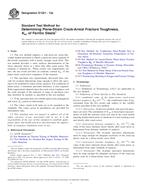
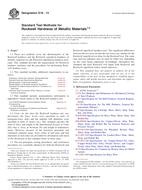 ASTM E18-14
ASTM E18-14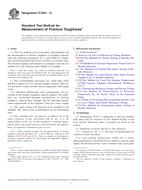 ASTM E1820-13
ASTM E1820-13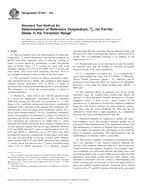 ASTM E1921-13a
ASTM E1921-13a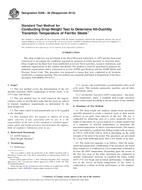 ASTM E208-06(2012)..
ASTM E208-06(2012)..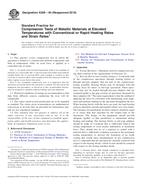 ASTM E209-00(2010)..
ASTM E209-00(2010)..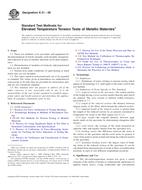 ASTM E21-09
ASTM E21-09
 Cookies
Cookies
